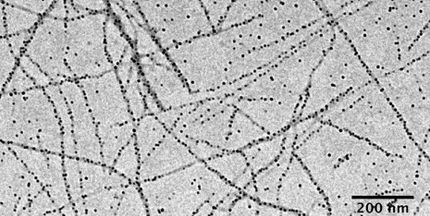More than the soul of a beer
FAU researchers investigate the antibiotic and antiviral effect of hops
hops are not only an essential raw material for brewing beer. Due to its special properties, hops have also been valued as a medicinal plant since ancient times. This is where the scientific work of Luisa Kober and Marco Dürsch comes in. The two researchers from the Chair of Bioprocess Engineering (BVT) at Friedrich-Alexander-Universität Erlangen-Nürnberg (FAU) are focusing on the positive effects of hops in their doctoral projects.
Luisa Kober and Marco Dürsch have one thing in common: both are working on research projects that are investigating the forward-looking question of how the antiviral and antibiotic effects of hops can be used innovatively in the bio-based production of animal foods.
Hops have an antibiotic and growth-promoting effect
"We are building on the millennia-old knowledge that hops are a medicinal plant," explains Luisa Kober. "The effect of hops has already been used in the past, for example to preserve beer." Her aim is now to use this property to use feed additives made from hop extracts for sustainable poultry production. "On the one hand, my research project aims to have an alternative to conventional antibiotics for the treatment and prophylaxis of bacterial infections in poultry farming. On the other hand, the use of hops in animal breeding is also particularly interesting because it can have a growth-promoting effect," says the biochemist.
The proof of her basic research can already be seen in practice: In cooperation with the university in Joinville in southern Brazil, where an FAU graduate is employed as a postdoc, microencapsulated hop extracts are being fed to a chicken farm. With corresponding success. Trends can already be seen that suggest an increase in the weight of the animals and the antibiotic effect of the so-called "micro-hops".
Effective use in poultry farming
"In view of the increasing problems caused by antibiotic-resistant germs, it only makes sense in terms of human and animal health to find an alternative to the use of antibiotics in poultry production," emphasizes Luisa Kober. Especially as the alternative is made from renewable raw materials and is therefore sustainable. And this in an area of food production that is constantly growing: poultry is the most consumed meat in the world, and the trend is rising. And the trend is still rising.
The same applies to Marco Dürsch and his doctoral project. The life science engineer is investigating the antiviral effect of hops and, in particular, of hop residues, such as those produced as a waste product in breweries or in hop refinement during the production of hop extracts, for the aquaculture of (food) fish. The controlled rearing of fish, mussels, crustaceans and the like is considered the fastest growing area for the production of food of animal origin. "This form of factory farming leads to the same problems as industrial animal husbandry on land," explains Marco Dürsch. "Especially in aquacultures, where fish live together in very confined spaces, the risk of fatal viral diseases is high."
Hop-based antiviral additives for fish feed
The FAU scientist is focusing in particular on the koi herpes virus, which mainly affects commercial carp in this country and is fatal in the vast majority of cases. He is also investigating the tilapia pond virus, which mainly affects common food fish in Asia, as well as two types of virus that primarily affect trout and salmon. "The koi herpes virus in particular is a huge problem because there is still no approved prophylaxis or drug treatment in Europe," says Marco Dürsch. "Research on these virus species has been ongoing at the Chair for several years. Ultimately, the chair's own brewery and our involvement with the brewing process led us to take advantage of the properties of hops."
With success: the effectiveness has already been demonstrated. In the laboratory, Marco Dürsch is now investigating different hop varieties to see which of the individual ingredients prove to be particularly effective as an antiviral agent. Once the substances have been identified, they are selectively enriched using adapted extraction processes and also microencapsulated in order to ultimately produce the prototype of an additive for corresponding fish feed.
The scientific examination of the preventive effect of hops has a special appeal for him and Luisa Kober: "Being able to develop something with substances of natural origin that has a lasting disease-preventing effect, thus advancing bio-based food production and ultimately addressing challenges for society as a whole, is a great incentive."
Note: This article has been translated using a computer system without human intervention. LUMITOS offers these automatic translations to present a wider range of current news. Since this article has been translated with automatic translation, it is possible that it contains errors in vocabulary, syntax or grammar. The original article in German can be found here.






























































